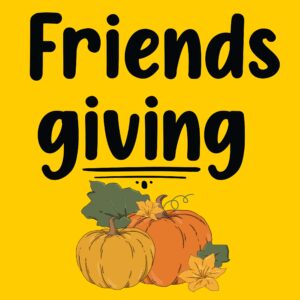
According to Merriam-Webster:
Friendsgiving is a blend of friend and Thanksgiving, and it refers to a large meal eaten with friends either on or near Thanksgiving. People are serious about their Friendsgiving celebrations: there are how-tos, sample menus, rules, and even commandments for Friendsgiving. But when Friendsgiving first came into use, it was used to describe something much more informal than the traditional Thanksgiving meal.
FIRST USE OF THE WORD FRIENDSGIVING
The term began to show up around 2007 and its origins are murky. Was it the TV series Friends that inspired the idea of spending holidays with friends or a 2011 Bailey’s Irish Cream advertising campaign? Regardless the term took off, becoming the center of an episode on the Housewives of New Jersey.
THE ORIGINS OF THE ORIGINAL FRIENDSGIVING (THANKSGIVING)
Puritans who arrived on the North American continent in the early 1600s frequently celebrated days of giving thanks to the Lord via prayer for their successes. They expressed gratitude for events such as military victories, good crops, prosperity, or an end of epidemics. They viewed their successes as a sign of God’s approval of their actions.
During the American Revolution, days of giving thanks were called for by the Continental Congress and George Washington. Presidents John Adams and James Madison continued this practice.
THE FIRST FRIENDSGIVING (THANKSGIVING) SOCIAL AND RELIGIOUS CELEBRATION
Harvest festivals date back a thousand years, so the Pilgrims’ (a Puritan sect) decision to celebrate their first successful corn harvest in 1621 was not surprising. The celebration lasted three days and was not a family-only affair. Friends participated, including the Wampanoag Native American tribe, with ninety men in attendance. Only fifty-three of the original Pilgrims from the Mayflower were alive by the time the festival occurred. Without the Native Americans, the Pilgrims would have perished.
However, others have laid claim to the first Thanksgiving banquet. Spanish explorer Juan de Oñate marched his expedition of 500 soldiers and colonists across Mexico’s Chihuahuan Desert. Out of food and water for five days, the group finally reached the Rio Grande—and survived. Onate declared a feast and mass in 1598.
Then, there’s the Thanksgiving and Mass held in 1565 when Pedro Menéndez de Avilés and 800 Spanish settlers landed in Florida, founding St. Augustine. They invited the native Seloy tribe to their extravaganza. The National Park Service had this to say about the meal:
From our knowledge of what the Spaniards had on board their five ships, we can surmise that it was cocido, a stew made from salted pork and garbanzo beans, laced with garlic seasoning, and accompanied by hard sea biscuits and red wine. If the Seloy contributed to the meal from their own food stores, then the menu could have included turkey, venison, gopher tortoise, mullet, drum, sea catfish, maize (corn), beans, and squash.
Who knew? Why didn’t the Hispanics get credit for the first Thanksgivings? Maybe it’s time to rewrite our history to reflect more accurately what happened during our founding years.
THE ORIGINAL FRIENDSGIVING (THANKSGIVING) BECOMES A NATIONAL HOLIDAY
The national holiday of Thanksgiving, as we know, was established by Abraham Lincoln. On October 3, 1863, heartened by the Victory of Gettysburg, he proclaimed a day of Thanksgiving and prayer to be held on November 26, to be observed yearly on the fourth Thursday of November.
FYI: The idea wasn’t originally his. Please realize that the idea for an annual day of Thanksgiving belonged to a woman, Sara Josepha Hale. While she is unfamiliar to most of us, we know her poem, “Mary Had a Little Lamb”. From her platform as the editor of Godey’s Lady’s Book, she began to push for the national holiday in 1846. Of course, her pleas were ignored until a man said, “I have an idea!”
FINAL THOUGHTS ON FRIENDSGIVING
I did not live near relatives growing up so we never celebrated Thanksgiving with extended family. The origins of this day were never about family, but about friends. My thought is that we don’t need another/different holiday. We should not wait for a special day to celebrate with friends. This should be a year-round occurrence.
Note: For Native Americans, Thanksgiving has a dark side. Although they welcomed the Pilgrims and other new arrivals, the newcomers quickly turned on the Native Americans, taking their lands, killing them off with diseases, and destroying their culture.
While we celebrate our bountiful lives, we should contemplate how we can be a better country for all our inhabitants.
Sign up on www.mariewatts.com to receive future Stories About Life delivered to your email address or read more stories by clicking here.

Recent Comments